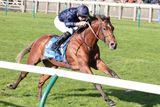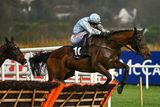A short history of race fixing . . . the great cob n'foal swindle
FOR centuries, racing has been littered with stories of corruption. But it is the contemporary heat of these latest events that make them so chilling. Where there is betting, there are bound to be attempts at "fixing" the outcome: football, cricket, and snooker are just three other sports that have found this out to their cost, but racing remains the preferred choice of those who seek to profit from skulduggery.
FOR centuries, racing has been littered with stories of corruption. But it is the contemporary heat of these latest events that make them so chilling.
Where there is betting, there are bound to be attempts at "fixing" the outcome: football, cricket, and snooker are just three other sports that have found this out to their cost, but racing remains the preferred choice of those who seek to profit from skulduggery.
It has been that way ever since Daniel Dawson was sentenced to death in 1812 for fatally poisoning three racehorses. Then, 32 years later, the Derby, Britain's most sacred race, was scarred by the discovery that a race restricted to three-year-olds was 'won' by the four-year-old Maccabaeus, masquerading under the name Running Rein.
Every hot favourite that runs badly has always attracted a sniff of suspicion. Pas Seul in the 1962 Cheltenham Gold Cup, Ribofilio in the 1969 2,000 Guineas, and Gorytus in the 1982 Dewhurst Stakes are just three horses widely thought to have been "nobbled".
But rumours of doping become an unavoidable fact in 1990 when two horses, Norwich and Bravefoot, were found to have been "got at" by someone using ACP, a tranquiliser that is used for legitimate purposes such as calming a fractious horse when its coat needs to be clipped.
It emerged - a decade later - that the pair were part of an astonishing 23-horse doping spree within a two-month period, that was administered by a former trainer and jockey called Dermot Browne, who confessed to the charges and was banned for 20 years by the Jockey Club. Browne claimed he was in cahoots with Brian Wright, since named by police as the man suspected of being Britain's biggest cocaine dealer. Wright is currently on the run. Wright has long been viewed as racing's bogeyman, the 'Mr Big' behind most horseracing corruption, who orchestrated sustained race-fixing over a period of up to 20 years. He was one of 15 people, including five jockeys, arrested in 1998 as part of a race-fixing investigation that was badly handled by both the Jockey Club and the UK police. No one was convicted. Since then, racing's integrity has found itself fighting a new spectre - betting exchanges, the internet gambling phenomenon that allows people for the first time to "lay" a horse, and thus profit when it doesn't win. Traditional, high street bookmakers offer win opportunities only.
For the last four years, virtually all Jockey Club probes into alleged corruption have focused on betting exchange activity. Betting exchanges were linked to two races in March, which saw Kieren Fallon and Sean Fox each banned for 21 days for riding injudicious races. Fox, who is appealing his ban next week, was a particularly eye-catching case as he fell off his mount Ice Saint in an inept manner.
Ironically in May, Ladbrokes chief Chris Bell was roundly condemned for claiming in an interview that "one race per day in British racing is fixed". Suddenly his views do not seem so outrageous. (© Independent News Service)














